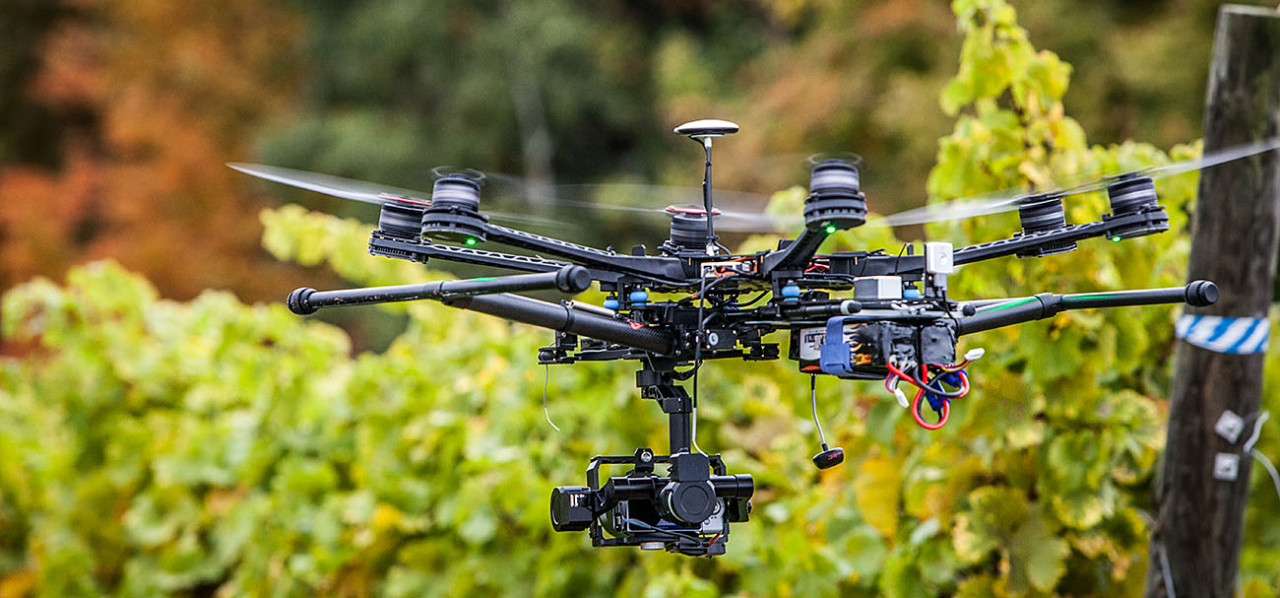Drones on the Horizon
Posted in: Innovation, Life at H-I
[youtube http://www.youtube.com/watch?v=CRdwj9vk2Gc&w=853&h=480]
A deep-dish pizza, movie rental or even roses for that special someone eventually may be just a drone flight away.
A growing number of businesses, from florists to real estate agencies, are exploring the use of drones — officially known as unmanned aerial vehicles in the industry — to market products. Ann Arbor-based Domino’s delivered pizza by air in the United Kingdom last summer, and Amazon CEO Jeff Bezos recently said the devices could be dropping packages by 2015.
On the surface, the possibilities are endless: Drones could help check crops, fix wind turbines or explore burning buildings.
“When you start thinking of all the different opportunities of how this can better mankind, it’s really cool,” said Joe Joachim, CEO of a Detroit-based drone company, Hello Aerial.
There’s just one wrinkle: The use of drones for commercial purposes is illegal.
The Federal Aviation Administration has grounded all commercial drone use, citing safety concerns. Only the military and hobbyists flying below 400 feet in unpopulated regions are legally allowed to operate drones.
Brenden Schulman, a New York-based attorney who specializes in drone regulation law, said the federal restrictions are frustrating for many in the fledgling industry.
“There are a lot of different industries where people want to use and develop the tech,” he said. “That whole cycle of investment and development has been disrupted by our federal government. That’s put us at a real disadvantage compared to other countries.”
That hasn’t stopped many companies from giving drones a whirl, however.
The Farbman Group, a Southfield-based real estate company, bought a drone to take photos and videos of its properties. Commerce Township-based FlowerDeliveryExpress.com last month tested a drone for flower delivery, successfully landing a bouquet at a West Bloomfield Township home just before Valentine’s Day.
[youtube http://www.youtube.com/watch?v=TbtWczEXGmc&w=853&h=480]
Interest in drones is also coming from the manufacturing and creative sectors.
Firms from Ann Arbor to Birmingham have the technology but can’t sell to clients because of the tough federal rules. Among them is Hello Aerial, which has invested more than $1 million in drone technology in less than a year.
“Regulation needs to happen soon,” Joachim said. “We’re holding back the innovation that truly can make a difference. We could start saving lives tomorrow.”
The FAA recently took a small step forward by naming six commercial drone tests sites in the U.S.; none were in Michigan. Congress has told the FAA to come up with a commercial use plan by September 2015, and many businesses are hopeful the agency will loosen the rules.
FAA regulations welcomed
Hello Aerial has hired expert engineers, pilots, videographers and photographers to consult on the best way to build, fly and test drones.
The company owns 15-20 drones, with some costing as much as $200,000. Individual pieces that help stabilize the camera in the air can cost up to $2,000, Joachim said.
“It’s a money pit, but if you don’t get in the water when everyone’s scared to do it, you miss the opportunity,” he said.
He’s been able to skirt FAA rules by donating the use of his machines to local companies, while following hobbyists’ rules.
He’s created breathtaking videos capturing unique angles of Campus Martius downtown from a drone on a wire, Ford trucks during test-drives, the Pictured Rocks and even historic Detroit structures.
He said he treats his drone operation “like an airline” and welcomes regulations that will separate professionals from amateurs.
“Once the regulations are in place, it allows companies to do things rapidly,” he said. “It will get rid of all the stories of people who shouldn’t be doing it in the first place. You have to put some boundaries around it.”
That’s the sentiment of Tom Brady, one of the founders of Ann Arbor-based SkySpecs, which is in the prototype stage of building and selling its own drones. Brady’s model, which weighs less than 10 pounds and is about two feet long, is primarily intended to inspect wind turbines and other infrastructure in need of repair.
“It would be hugely beneficial, and there’s a huge need for it in Michigan,” he said. “We understand where the FAA is coming from. The regulations are in place for a reason.”
Businesses wait and see
That reason, the FAA says, centers on privacy and safety.
“The concern is safety of persons and property in the air and on the ground, and safe integration into the airspace,” the FAA said in a statement. “We’re also concerned about careless and reckless operation. There have been cases when people are injured when UAS (unmanned aerial systems) fly into crowds or fall onto people.”
The government agency has shut down many would-be commercial businesses, including a beer-delivery service in Wisconsin, and the FlowerDeliveryExpress.com operation.
Schulman is fighting a case against the FAA that could prove there’s no legal ban on commercial drone use, but until a ruling is made, most business owners are in wait-and-see mode.
They include Karl Sachs, owner of Birmingham-based R4 Robotics. He has spent millions of dollars on drone technology and has grown impatient with the lack of movement by the FAA.
He said the market in Michigan for drones in agriculture and infrastructure is vast, and the industry could employ thousands making, flying and fixing the machines.
“A state like Michigan, with its wealth of engineers, is one of the reasons I’m staying here,” he said. “With home-grown talent, we could make it work and make it run if it wasn’t for those idiots in Washington.”
Originally published on The Detroit News
























4 comments